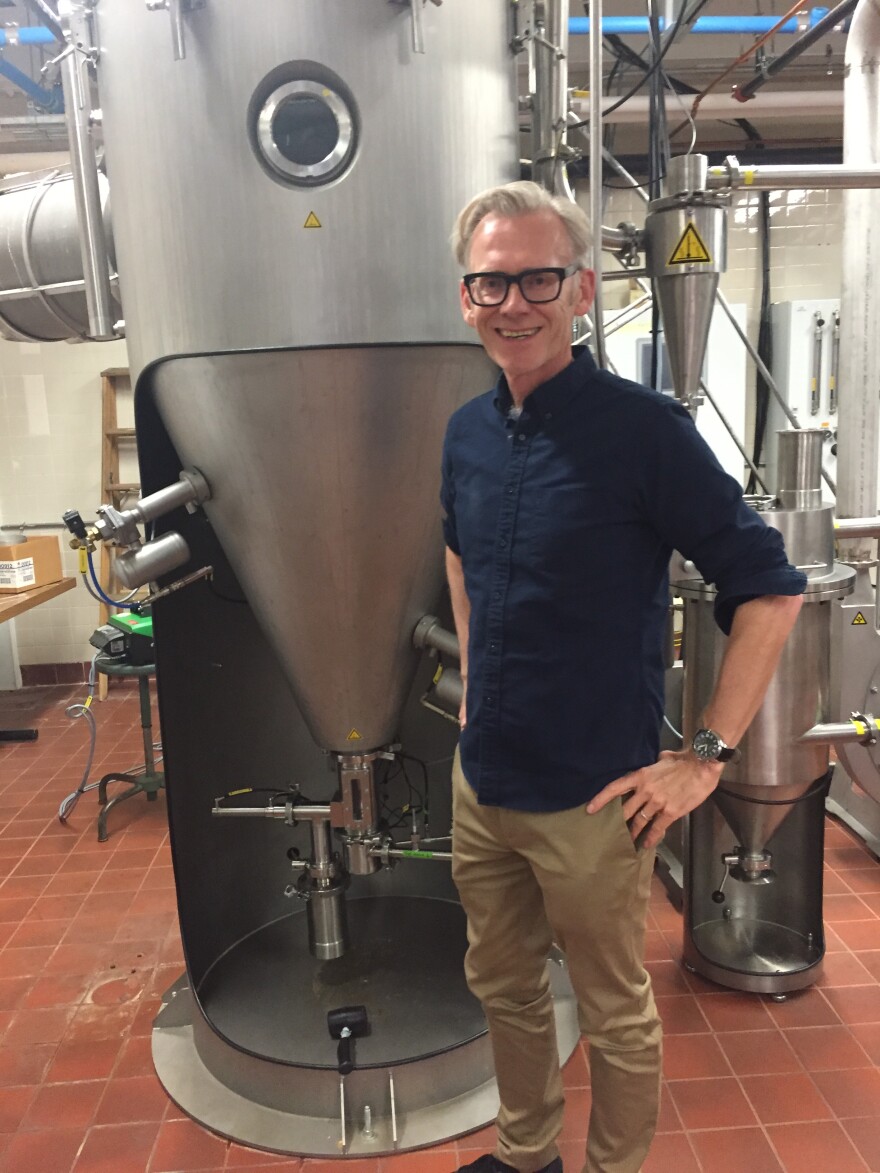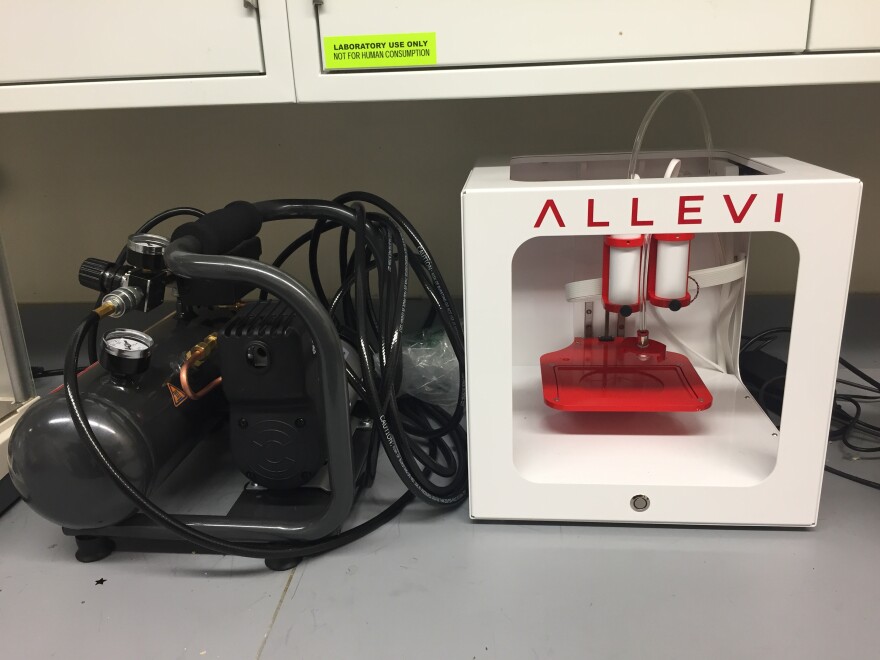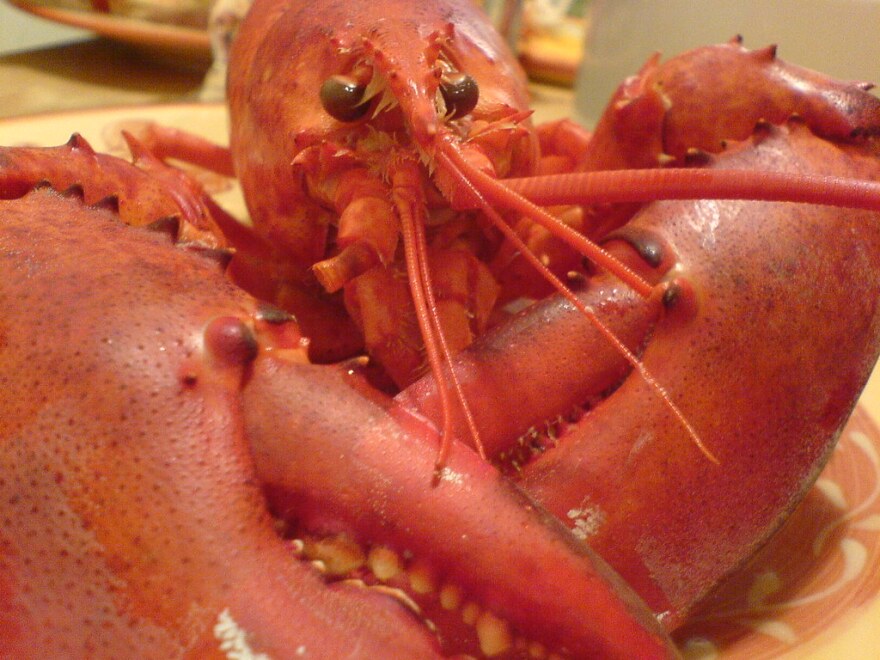There's a lot of debate about the safety and value of food that's been processed, from genetic modification to nutritional enhancement.
UMass Amherst food scientist Julian McClements often wades right into the middle of those debates.
McClements makes the case that there's good processed food — and bad. He maintains the future of the global food supply will rely on some manipulation of nature, and flexibility by consumers.
A visit to McClements’s campus office illustrates how far that flexibility could go. Hanging from his bulletin board is a packet of wrinkled, squishy red things that one of his students brought from China.
“It’s some kind of weird fruit I’ve never seen before,” he said. “But it's all in Chinese, so I don't know what it is.”
Then McClements picked up a box of dead crickets, labeled “bacon and cheese” flavored.

“You can see their little eyes,” he said. “A few are looking at us.”
He bought the crickets on Amazon, and after a few pints of beer, talked himself into eating some.
“I spent the next couple of days pulling cricket legs out of my teeth,” he said.
The typical Western consumer might cringe at these culinary choices, but they're consistent with McClements’s general outlook on food — namely, society will have to get over its mistrust of the unfamiliar to keep up with modern food dilemmas.
Among those dilemmas: how to feed the nine billion people on the planet, how to reduce pesticide use and other toxins, and how to get healthy food to those who don't have money to shop at organic co-ops or time to cook from scratch.
“I think that's where, in the future, the food industry really needs to go,” McClements said, “to keep [food] cheap, convenient and tasty, but also make it much healthier.”

McClements is a world-renowned food scientist who just published a book called "Future Foods: How Modern Science Is Transforming the Way We Eat." It highlights the ways technology is improving the food supply, and defends many types of food processing he considers misunderstood.
McClements does consult for several food companies — including Nestlé, Kraft and Pepsi — that have come to represent the worst of processed foods: those made with high fat, salt and sugar.
“It's very difficult, if you want to do proper food science research, to not be involved with the food companies — because all the research you do, you want to ultimately be put into a food product,” he said.
Partly because of consumer demand, he said, even industry giants are working on healthier versions of processed food. Plus, the term itself is so vague, he said, people don't realize how much processing they accept in their regular diets.
“To give you an example, if you developed a new technology, and you put some bread in there, and it causes all the DNA in the bread to break down, and it caused, you know, all these cancerous compounds to be formed — would you ever use it?” he said. “Most people would say no. But that would be a toaster.”

In other words, just cooking changes the molecular makeup of food. But there are, of course, more invasive methods of processing, including at McClements’s lab at UMass.
McClements specializes in nanotechnology, which uses ultrasound waves to create tiny particles of nutritional content, which are then injected into food otherwise short on nutrients.
The projects in his lab include getting fish oil into bread so you can't see or taste it, and working with the NASA Mars Mission to stop vitamins breaking down too quickly in freeze-dried foods — to keep astronauts healthy all the way to the red planet.

McClements said nanotechnology is especially important in developing countries, where vitamin deficiencies can cause blindness, stunted growth and other serious problems.
“You can convert [the nutritional nanoparticles] into a powder, something they could take and put into a soup, or stew, or something like that,” he said.
People have called what he works on “frankenfoods” — a manipulation of nature.
McClements understands the concerns. He does his own research on the safety of nanoparticles, though he says most are harmless. And he says it makes sense to question anything that changes DNA structure, including genetically engineered food, or GMOs.
But after products have been rigorously tested for safety, as GMOs have, he wishes people would focus on the good this technology can do, such as making crops resilient to climate change, slowing rot to reduce waste, or reducing the need for pesticides.
“I think that people in the West who are against genetic engineering — I think that could really hurt people in developing countries,” he said. “Because the industry won't invest in it.”
Still, the future of food is not all about health. McClements also writes about developments that seem right out of science fiction. Those include meat that's grown from animal cells in a test tube; or 3D food printers, like the prototype that UMass keeps in the basement below McClements’s office.

But McClements does not believe technology alone can protect the planet; humans still need to make good choices. He considers fresh fruits and vegetables the gold standard for healthy eating, and he's recently become a vegetarian, in part, because meat production is so resource-heavy.
Still, McClements says science can help with those choices, creating a vegetarian burger that tastes like cow, or fake eggs with the consistency of an omelette.
“[That's] a big trend in the food industry at the moment, to try and make everything all plant-based for environmental and sustainability reasons,” he said.
So let's get back to edible crickets, which have high protein and mineral content, and put minimal stress on the planet. Food scientists are trying to make insects palatable to more people.
McClements knows it's not easy to get over the ick factor, but you never know. Consider the lobster, which he's always found kind of gross.

“Two hundred years ago, lobsters were seen as food for the poor and for prisoners, and now lobsters is a really fancy food for rich people — and it looks like a giant cockroach,” he said with a grimace. “I wouldn't touch it with a barge pole.”
Another sign that anyone can be a picky eater — even the food scientists.















